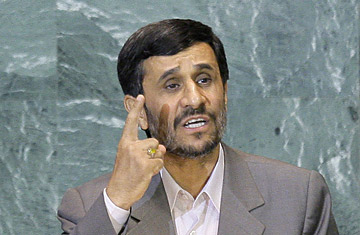
Iranian president Mahmoud Ahmadinejad addresses the 63rd session of the United Nations General Assembly Tuesday, Sept. 23 2008 at the United Nations.
(2 of 4)
You describe your personal encounters with both President Ahmadinejad and some members of his administration, and you have actually translated his speeches at the U.N. Should Americans be as worried as we are about him?
I don't think so. Even though he does represent an important segment of society, Ahmadinejad simply does not wield the kind of power in Iran that, for example, American presidents hold under the U.S. constitution. Iran's president cannot set foreign policy, nor is he the commander-in-chief. The Supreme Leader has the last word. That said, an Iranian president does manage day-to-day government affairs, and can influence policy. But that is a far cry from being in the position of an American President, what Bush has called "the Decider."
You talk about the overturn of Iran's class structure after the revolution of 1979, and what that tells us about Iran today. How did that upheaval affect you personally, as someone from the upper classes under the Shah?
It affected me greatly and was part of the reason I didn't go to Iran for many years after the 1979 revolution. People like me, whose family was associated with the Shah's regime, would not have been welcome or even permitted to visit Iran. But things have changed. Today, the Iranian government is more self-confident and no longer feels so threatened. And now the revolutionaries have become Iran's upper-class, but with a big difference: they try to avoid ostentatious displays of wealth. To take one example, President Ahmadinejad makes a point of dressing simply, and continues to live in the same modest house that he and his family have long occupied.
Your book includes, some might say, an affectionate portrait of Shi'ite Islam as it is practiced in Iran. In America, we tend to think of Shi'ites in terms of radical militias in Iraq, or Hezbollah in Lebanon. Do you think our perception of Shi'ism and Shi'ite Muslims is all wrong?
Not entirely, but yes, there are misconceptions. Shi'ite Islam, unlike the stricter forms of Sunni Islam as practiced in Saudi Arabia, is far more flexible and pragmatic than we think. And Shi'ites, despite their sometimes hysterical rhetoric and outbursts, have generally been less fanatical than their Sunni counterparts, especially than al-Qaeda (which openly denounces Shi'ism and Shi'ites). Even in Iraq, the Sunni insurgency has been far more deadly to Americans and Iraqis than any Shi'ite militia. And it's worth remembering that — rhetoric aside — Iran's ruling Shi'ites haven't started a war against another country in centuries, whether for religious or geopolitical reasons.
